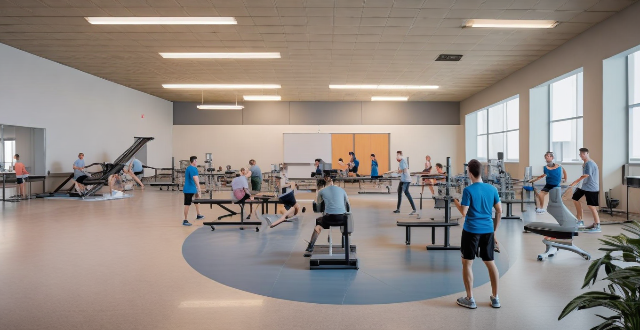Performance Health

How does hydration impact athletic performance and health ?
Hydration is crucial for athletic performance and health. Adequate hydration maintains energy levels, muscle function, joint lubrication, heart rate, and cognitive function during exercise. Dehydration can lead to fatigue, muscle cramping, increased heart rate, impaired cognitive abilities, and decreased physical performance. Proper hydration also aids digestion, kidney function, skin health, immune system function, and body temperature regulation. Chronic dehydration can increase the risk of kidney stones, digestive issues, weakened immune system, and other health problems. Therefore, it is essential for athletes to stay well-hydrated to achieve optimal performance levels and support their overall health.

How does sleep quality affect athletic performance and health ?
This text explains how sleep quality affects athletic performance and overall health. It emphasizes the importance of sleep for physical recovery, mental well-being, and immune system support in athletes. Poor sleep quality can lead to decreased performance, increased injury risk, and mental health issues. The text provides tips for improving sleep quality, such as establishing a consistent sleep schedule and creating a comfortable sleep environment. Adequate sleep is crucial for optimal athletic performance and overall health.

Can sports improve academic performance in adolescents ?
Sports can positively impact academic performance in adolescents by improving physical health, mental well-being, and social skills. Studies show a positive correlation between sports participation and academic achievement, with athletes often achieving higher grades and increased college admission rates. However, individual differences and external factors must also be considered when evaluating this relationship.

Can certain vitamins improve athletic performance ?
Vitamins play a crucial role in various bodily functions, including metabolism, immunity, and tissue repair. Athletes often seek to optimize their performance by ensuring they have adequate vitamin intake. Certain vitamins like B-complex, Vitamin D, Vitamin C, and vitamins A, C, and E can improve athletic performance by supporting energy metabolism, muscle function, recovery, and immunity. However, it's essential to ensure an adequate intake through a balanced diet and consider supplementation only when necessary and under professional guidance. The key is to find the right balance that works for each individual athlete's unique needs and circumstances.

How does lack of sleep impact athletic performance ?
The text discusses the importance of sleep for athletes, explaining that adequate sleep is essential for muscle recovery and repair, cognitive function, and regulation of energy levels. Lack of sleep can negatively impact athletic performance by decreasing endurance, impairing reaction time and coordination, increasing the risk of injury, altering mood and mental health, and reducing motivation and focus during training or competition. The article concludes that prioritizing sleep as part of an athlete's overall training regimen is crucial for optimal performance.

How can sports medicine improve an athlete's performance ?
Sports medicine can improve an athlete's performance by focusing on injury prevention and management, optimal recovery strategies, mental health support, performance enhancement through strength and conditioning programs, biomechanical analysis, pain management, and medical care and treatment. It involves a holistic approach to addressing an athlete's physical health, mental well-being, nutrition, and recovery processes.

How can nutrition affect an athlete's performance ?
Nutrition plays a pivotal role in an athlete's performance, providing essential energy, aiding recovery, and maintaining overall health. A balanced intake of macronutrients, such as carbohydrates for immediate energy, proteins for muscle repair and growth, and fats for long-term energy, is crucial. Micronutrients like vitamins and minerals also contribute to metabolic functions and electrolyte balance. Hydration is vital for fluid balance and preventing performance decline due to dehydration. Timing of nutrient intake, before, during, and after exercise, significantly impacts performance and recovery. Strategic dietary planning, including periodized nutrition and anti-doping compliance, ensures athletes meet their specific needs and maintain clean sport standards. Overall, a well-structured nutritional plan can enhance athletic performance and success in sports.

Can sports supplements improve athletic performance ?
Sports supplements claim to enhance athletic performance, but their effectiveness varies. Common types include protein, creatine, pre-workout, BCAAs, and multivitamins/minerals. Some studies support their benefits, especially when used correctly and in conjunction with proper nutrition and training. However, potential downsides include health risks, unproven claims, and high costs. Consult a healthcare professional before using sports supplements to ensure they align with individual goals and health status.

What is the relationship between sleep and athletic performance ?
The relationship between sleep and athletic performance is crucial, as adequate sleep is essential for athletes to perform at their best both physically and mentally. During sleep, the body undergoes recovery and repair processes, including muscle growth and repair and immune system functioning. Sleep also plays a vital role in maintaining mental health and cognitive functioning, such as concentration and focus and mood regulation. Additionally, sleep is crucial for maintaining energy levels and endurance, particularly for endurance athletes. However, sleep deprivation can have several negative effects on an athlete's performance, including decreased reaction time, impaired coordination, reduced endurance, increased perceived exertion, and altered perception. Therefore, it is essential for athletes to prioritize their sleep and ensure they get enough restful sleep each night to maximize their athletic performance.

In what ways does mental health support impact overall women's health ?
This text discusses the importance of mental health support for women's overall health, highlighting its impact on physical health, emotional well-being, relationships, and work performance. It emphasizes that good mental health can reduce the risk of chronic diseases, improve sleep quality, and help manage pain. Additionally, it mentions how mental health support can enhance emotional well-being by reducing stress, improving mood, and increasing resilience. The text also points out that mental health support can strengthen relationships through improved communication, better emotional regulation, and greater empathy. Lastly, it notes that mental health support can enhance work performance by improving focus, reducing absenteeism, and increasing job satisfaction.

How can I improve my athletic performance through diet
Improving athletic performance through diet involves eating a balanced diet, increasing protein intake, consuming plenty of fruits and vegetables, drinking enough water, avoiding processed foods, eating before training or competition, and considering supplements. A balanced diet includes carbohydrates, proteins, and healthy fats in the right proportions. Protein is essential for building muscle and repairing damaged tissues, while fruits and vegetables are rich in vitamins, minerals, and fiber. Drinking enough water is crucial for staying hydrated during exercise. Avoiding processed foods can prevent harm to your performance and health. Eating before training or competition can provide energy and prevent fatigue. Supplements such as whey protein powder, amino acids, and BCAAs can improve performance but should be taken under the guidance of a nutritionist or doctor.

Can wearable technology improve athletic performance ?
The text discusses the potential benefits of wearable technology for athletes. Wearable devices can provide real-time feedback, goal setting and tracking, motivation, injury prevention, and data analysis to improve athletic performance. However, they should not replace traditional training methods or professional coaching. Athletes should use them as a tool to complement their existing training program and consult with experts when making decisions about their training and performance goals.

How do psychological factors influence sports performance and research ?
This document discusses the influence of psychological factors on sports performance, emphasizing the importance of motivation, confidence, concentration, resilience, and team dynamics. It highlights how these elements can enhance or hinder athletic performance and underscores the significance of research in understanding and applying psychological principles to optimize athlete mental states. The text concludes by noting the potential for ongoing research to refine our comprehension and application of psychology in sports, aiming to help athletes achieve their full potential mentally and physically.

What role does recovery play in a sports health management plan ?
Recovery is a crucial component of sports health management, enhancing performance, preventing injuries, promoting mental health, and maintaining a balanced lifestyle. It involves activities like sleep, nutrition, stress reduction techniques, and time management to ensure athletes can perform at their best while staying healthy and motivated.

What is the impact of altitude on sports performance ?
This article explores the impact of altitude on sports performance, including its effects on oxygen availability, respiratory rate, and heart rate. It discusses how altitude affects endurance sports, power sports, and team sports differently and provides strategies for dealing with altitude such as acclimatization, proper hydration and nutrition, and training at altitude. The article emphasizes the importance of managing these challenges to maximize performance under challenging conditions.

How important is nutrition in optimizing athletic performance at a competitive level ?
Nutrition is crucial for athletic performance, providing energy, aiding recovery, and maintaining health. Key aspects include consuming carbohydrates for energy, proteins for muscle repair, staying hydrated, obtaining necessary micronutrients from a varied diet, timing nutrient intake around exercise, and personalizing nutrition plans. These practices help athletes maximize their training and competitive outcomes.

What impact does female leadership have on organizational culture and performance ?
The impact of female leadership on organizational culture and performance is significant. Women leaders prioritize collaboration, diversity, emotional intelligence, innovation, financial performance, and customer satisfaction, leading to a positive work environment and business success.

What are the best ways to enhance athletic performance ?
Improving athletic performance involves a combination of physical, mental, and lifestyle factors. Here are some strategies that can help athletes reach their full potential: ## Physical Training ### Strength and Conditioning - Incorporating weight training helps build muscle strength and endurance. - Plyometrics exercises like box jumps and bounding improve power output, crucial for many sports. ### Technique and Drills - Perfect practice makes perfect; focusing on the quality of movements rather than just quantity. - Practicing game scenarios can enhance decision-making skills under pressure. ### Recovery - Light activities like walking or swimming can aid recovery. - Stretching and foam rolling help reduce muscle soreness and improve flexibility. ## Nutrition and Hydration ### Diet - Consuming a mix of proteins, carbohydrates, and healthy fats supports energy levels and recovery. - Drinking enough water is essential for maintaining performance and preventing cramps. ### Supplementation (When Needed) - Sports drinks during prolonged exercise can replenish electrolytes and provide energy. - Post-workout protein shakes can aid in muscle repair. ## Mental Preparation ### Visualization - Seeing yourself succeed in your mind's eye can boost confidence and focus. - Setting clear, achievable goals provides direction and motivation. ### Mindfulness and Stress Management - Meditation can reduce anxiety and improve concentration. - Controlled breathing can lower stress levels before and during competition. ## Lifestyle Habits ### Sleep - Athletes need adequate rest to recover physically and mentally. - Maintaining a consistent sleep schedule optimizes rest. ### Avoiding Negative Habits - Substances can impair judgment and harm performance. - High stress levels can negatively impact both physical and mental health.

What kind of food and drinks should I consume to enhance my performance during exams ?
Proper nutrition is vital for exam performance, helping to maintain focus and energy. Recommended brain-boosting foods include lean proteins, complex carbohydrates, healthy fats, and antioxidant-rich items. Hydration is also key, with a suggestion to avoid sugary drinks and excessive caffeine. Meal ideas provide balanced options for breakfast, lunch, snacks, and dinner, emphasizing the importance of consistent healthy eating habits in the lead-up to exams.

How does climate change affect the performance of athletes in outdoor sports ?
Climate change significantly impacts outdoor sports by altering temperature, precipitation patterns, and air quality. Athletes face challenges such as dehydration, heat-related illnesses, muscle injuries from cold weather, event cancellations due to heavy rainfall, reduced efficiency in drought conditions, and respiratory problems from increased pollutants. Altered seasons disrupt training schedules and event scheduling. Strategies for adaptation include flexible scheduling, indoor alternatives, advanced performance wear, environmental simulation in training, health education, and readily available medical care during competitions.

Can a sports rehabilitation center help me improve my overall fitness and performance ?
Sports rehabilitation centers offer customized programs, state-of-the-art equipment, professional staff, and mental health support to help athletes recover from injuries and improve their overall fitness and performance. By working with these centers, athletes can develop customized recovery plans, improve their performance, and learn proper techniques for exercising safely.

What are the best sports nutrition supplements for enhancing athletic performance ?
The article discusses the importance of sports nutrition supplements in enhancing athletic performance. It highlights five key supplements that can help athletes improve their performance: 1. Protein Supplements: Essential for building and repairing muscles, protein supplements like whey, casein, and soy protein can support muscle growth, increase strength, and improve body composition. 2. Creatine Supplements: Popular among athletes for increasing muscle mass and improving performance during short, high-intensity exercise. Creatine also enhances recovery between workouts. 3. Beta-Alanine Supplements: An amino acid that increases muscle carnosine levels, beta-alanine can improve endurance capacity during high-intensity exercise, reduce fatigue, and enhance muscle strength and power. 4. Caffeine Supplements: A natural stimulant that can increase energy levels, reduce fatigue, improve mental focus, and enhance endurance capacity during prolonged exercise. 5. Multivitamins and Minerals Supplements: Important for overall health and well-being, multivitamins and minerals can help prevent nutrient deficiencies that could impair performance and enhance immune function and recovery from training. The article emphasizes the importance of choosing safe and effective supplements that meet the specific needs of an athlete and consulting with a healthcare professional or registered dietitian before starting any new supplement regimen.

How can educational psychology aid in addressing students' mental health issues ?
Educational psychology can aid in addressing students' mental health issues by understanding the role of emotional intelligence, promoting a positive school climate, providing early intervention and support services, encouraging self-care and resilience, and facilitating collaboration between educators and mental health professionals.

Can AI improve sports performance and athlete safety ?
Artificial Intelligence (AI) is transforming the sports industry by enhancing athletic performance and ensuring athlete safety through personalized gear design, optimized nutrition and training schedules, and injury prevention. AI's predictive capabilities help in preemptive measures against injuries, while wearable technology provides real-time data for monitoring an athlete's physical state. The future of AI in sports holds immense potential for real-time feedback, strategy adjustments, and fair play enforcement.

What is sports psychology and how does it impact athletic performance ?
Sports psychology is a specialized branch of psychology that focuses on how psychological factors influence athletic performance. It encompasses the study of athletes' motivation, mental preparation, concentration, confidence, team dynamics, and the psychological aspects of injury and recovery. By understanding these elements, sports psychologists help athletes enhance their performance, cope with stress, and achieve peak mental states for competition. The key areas of sports psychology include motivation, mental preparation, concentration, confidence, team dynamics, and injury and recovery. Motivation involves intrinsic and extrinsic motivation, as well as goal setting to improve focus and commitment. Mental preparation includes visualization and imagery, self-talk, and flow state. Concentration involves focus management and ignoring distractions. Confidence includes self-efficacy and mental toughness. Team dynamics involve group cohesion and role acceptance. Injury and recovery involve coping strategies for dealing with the emotional impact of injuries and maintaining motivation and positive mindset during rehabilitation. The impact of sports psychology on athletic performance is multifaceted, including enhanced performance through improved focus and increased resilience, mental health benefits such as stress reduction and boosted self-esteem, and team synergy through better communication and coping with pressure. Overall, integrating sports psychology into training regimes can help athletes cultivate the mental fortitude needed to reach their full potential and enjoy a healthier sporting lifestyle.

Are there specific sports that improve academic performance in children ?
The article discusses the potential benefits of different types of sports on academic performance in children. It highlights team sports like basketball, soccer, and volleyball for their ability to teach social skills, time management, and discipline. Individual sports such as swimming, tennis, and gymnastics are noted for promoting self-discipline, goal setting, and mental toughness. Outdoor sports like hiking, cycling, and rock climbing are mentioned for providing physical activity, stress relief, and exploration opportunities. The conclusion emphasizes the importance of considering individual differences among children when encouraging sports participation for academic improvement.

What are the effects of stress and pressure on an athlete's performance, and how can sports psychology mitigate these ?
Stress and pressure can have both positive and negative effects on an athlete's performance. In small amounts, stress can increase focus and motivation, leading to improved performance. However, excessive stress and pressure can have detrimental effects on an athlete's physical and mental health, as well as their overall performance. Sports psychology is a field that focuses on using psychological techniques to improve athletic performance and enhance overall well-being. Sports psychology professionals work with athletes to develop strategies for managing stress and pressure, improving mental toughness, and enhancing overall performance.

How do smart courts and fields improve player experience and performance ?
Smart courts and fields, equipped with advanced technologies such as sensors, artificial intelligence, and data analytics, have revolutionized the way athletes train and compete. These innovative environments not only enhance the player experience but also contribute significantly to their performance improvement. Here's a detailed breakdown of how smart courts and fields achieve this: ## Enhancing Player Experience ### Real-Time Feedback - **Instant Analysis**: Players receive immediate feedback on their techniques and strategies through sensors and AI, allowing them to make adjustments during practice or competition. - **Visualization Tools**: Augmented reality and virtual reality provide immersive training experiences, helping players better understand game scenarios and improve decision-making skills. ### Personalized Training Programs - **Data-Driven Approach**: Smart systems collect data on individual performances, enabling coaches to create tailored training programs for each player. - **Adaptive Learning**: As players progress, smart technologies adapt the difficulty level of training exercises to match their evolving skills. ### Increased Engagement - **Gamification**: Integrating game elements into training sessions boosts motivation and enjoyment, making workouts more engaging and fun. - **Social Interaction**: Online platforms connected to smart courts enable players to interact with peers, share achievements, and engage in friendly competitions remotely. ## Improving Performance ### Objective Assessment - **Accurate Metrics**: Advanced tracking systems provide precise measurements of speed, power, agility, and other key performance indicators. - **Error Detection**: Machine learning algorithms can identify subtle errors in technique that human eyes might miss, leading to more effective corrections. ### Injury Prevention - **Biomechanical Analysis**: Smart technologies monitor players' movements to detect patterns that could lead to injuries, allowing preventative measures to be taken. - **Load Management**: By analyzing workload data, smart systems help coaches make informed decisions about rest periods and training intensity to avoid overtraining. ### Strategic Insights - **Opponent Analysis**: Data collected from opponents' performances can reveal tendencies and weaknesses, aiding in strategic planning. - **Trend Forecasting**: Analytics tools predict future trends based on historical data, giving teams an edge in adjusting tactics and training regimens. ### Recovery Optimization - **Post-Workout Recovery**: Smart devices track recovery metrics like heart rate variability, suggesting optimal recovery times and methods. - **Nutritional Guidance**: Based on performance data, smart systems offer personalized nutritional advice to aid recovery and improve overall health.

What role does mental preparation play in improving running performance ?
Mental preparation is key to improving running performance. It involves setting clear goals, using visualization techniques, practicing mindfulness exercises, and employing self-talk strategies. By training the mind to focus on the task at hand, manage stress, and maintain motivation, runners can enhance their physical performance and achieve their running goals.

What role does sleep play in maintaining personal health ?
The text discusses the importance of sleep in maintaining personal health, including its roles in physical restoration and repair, energy conservation, weight management, memory consolidation, emotional regulation, cognitive function, stress reduction, mood stabilization, and relationship health. Adequate sleep is crucial for overall well-being, and prioritizing it can support physical, mental, and emotional health.